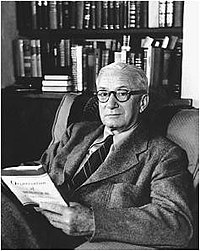Edwin Guthrie
| Edwin Ray Guthrie | |
|---|---|
 |
|
| Born |
9 January 1886 Lincoln, Nebraska |
| Died | 23 April 1959 (aged 73) |
| Known for | One Trial Theory |
| Scientific career | |
| Influences | Edward Thorndike |
| Influenced | William Kaye Estes |
Edwin Ray Guthrie (/ˈɡʌθri/; January 9, 1886 in Lincoln, Nebraska – April 23, 1959 in Seattle, Washington) was a behavioral psychologist. He first worked as a mathematics teacher, and philosopher, but switched to psychology when he was 33. He spent most of his career at the University of Washington, where he became full professor and then emeritus professor in psychology.
Guthrie is best known for his theory that all learning was based on a stimulus–response association. This was variously described as one trial theory, non-reinforcement, and contiguity learning. The theory was:
One word that his coworkers and students used to describe Guthrie and his theories was "simple", and perhaps he did prefer to use simple terms to illustrate complex ideas. However, "It is undoubtedly true that many reviews of Guthrie in the literature have mistaken incompleteness for simplicity".
His simple nature carried into his teachings where he took great pride in working with and teaching students.
Guthrie was born in Lincoln, Nebraska, to a father who owned a store selling pianos and bicycles, and a mother who was a school teacher. He remarked that his theories got an early start when he and a friend read Darwin’s Origin of Species and The Expression of the Emotions in Man and Animals while they were both in eighth grade. Guthrie graduated at the age of 17 after writing a rather inflammatory senior thesis that argued "that both science and religion, being dependent on words, and words being symbols dependent for their meanings on the experience of their users and auditors, would have no chance at expressing Absolute Truth". Guthrie received the title of lay reader in his local Episcopal Church while pursuing a philosophy degree from the University of Nebraska. This university he credited with helping him pursue his varied interests because "the university had none of the present apparatus of required courses and set curricula. . . . This freedom made possible the inclusion of courses in both Latin and Greek which had been begun in high school; mathematics through calculus"
...
Wikipedia
